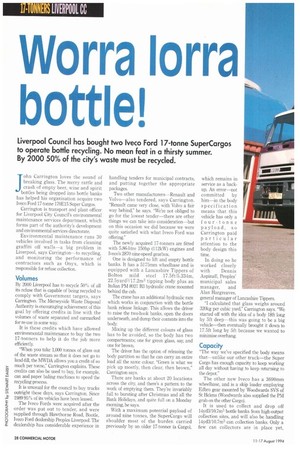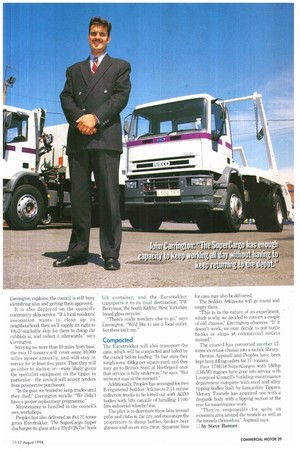Worra lora bottle!
Page 28

Page 29

If you've noticed an error in this article please click here to report it so we can fix it.
John Carrington loves the sound of breaking glass. The merry rattle and crash of empty beer, wine and spirit bottles being dropped into bottle banks has helped his organisation acquire two Iveco Ford 17-tonne 170E15 Super Cargos.
Carrington is transport and plant officer for Liverpool City Council's environmental maintenance services department, which forms part of the authority's development and environmental services directorate.
Environmental maintenance runs 30 vehicles involved in tasks from cleaning graffiti off walls—a big problem in Liverpool, says Carrington—to recycling, and monitoring the performance of contractors such as Onyx, which is responsible for refuse collection.
Volumes
By 2000 Liverpool has to recycle 50% of all its refuse that is capable of being recycled to comply with Government targets, says Carrington. The Merseyside Waste Disposal Authority is encouraging achievement of this goal by offering credits in line with the volumes of waste separated and earmarked for re-use in some way.
It is these credits which have allowed environmental maintenance to buy the two 17-tonners to help it do the job more efficiently "When you take 1,000 tonnes of glass out of the waste stream so that it does not go to land-fill, the MWDA allows you a credit of so much per tonne," Carrington explains. These credits can also be used to buy, for example, can and paper baling machines to speed the recycling process.
It is unusual for the council to buy trucks outright these days, says Carrington. Since 1989 95% of its vehicles have been leased.
The Iveco Fords were acquired after the order was put out to tender, and were supplied through Hawthorne Road, Bootle, Iveco Ford dealership Peoples Liverpool. The dealership has considerable experience in handling tenders for municipal contracts, and putting together the appropriate packages.
Two other manufacturers—Renault and Volvo—also tendered, says Carrington. "Renault came very close, with Volvo a fair way behind," he says. "We're not obliged to go for the lowest tender—there are other things we can take into consideration—but on this occasion we did because we were quite satisfied with what Iveco Ford was offering."
The newly acquired 17-tonners are fitted with 5.86-litre 150hp (112kW) engines and Iveco's 2870 nine-speed gearbox.
One is designed to lift and empty bottle banks. It has a 5175mm wheelbase and is equipped with a Lancashire Tippers of Bolton mild steel 17.5ft/5.334m, 22.5yard3/17.2m3 tipping body plus an Italian PM 8021 B3 hydraulic crane mounted behind the cab.
The crane has an additional hydraulic ram which works in conjunction with the bottle bank release linkage. This allows the driver to raise the two-hook banks, open the doors underneath, and dump their contents into the body.
Mixing up the different colours of glass has to be avoided, so the body has two compartments: one for green glass, say, and one for brown.
The driver has the option of releasing the body partition so that he can carry an entire load all the same colour. "Green is what we pick up mostly, then clear, then brown," Carrington says.
There are banks at about 20 locations across the city, and there's a pattern to the work of emptying them. They're invariably full to bursting after Christmas and all the Bank Holidays, and quite full on a Monday morning, he says.
With a maximum potential payload of around nine tonnes, the SuperCargo will shoulder most of the burden carried previously by an older 17-tonner (a Cargo), which remains in service as a backup. An error—not committed by him—in the body specification means that this vehicle has only a four-tonne payload, so Carrington paid particular attention to the body design this time.
In doing so he worked closely with Dennis Aspinall, Peoples' municipal sales manager, and Alan Hargreaves, general manager of Lancashire Tippers.
"I calculated that glass weighs around 320kg per cubic yard," Carrington says. "We started off with the idea of a body 18ft long by 5ft deep—this was going to be a big vehicle—then eventually brought it down to 17.5ft long by 5ft because we wanted to minimise overhang.
Capacity
"The way we've specified the body means that—unlike our other truck—the Super Cargo has enough capacity to keep working all day without having to keep returning to the depot."
The other new Iveco has a 3690mm wheelbase, and is a skip loader employing Edbro gear mounted by Woodwards SVS of St Helens (Woodwards also supplied the PM grab on the other Cargo).
It is used to collect and drop off 14yd3/10.7m3 bottle banks from high-output collection sites, and will also be handling 14yd3/10.7m3 can collection banks. Only a few can collectors are in place yet,
Carrington explains; the council is still busy identifying sites and getting them approved.
It is also deployed on the council's community skip service. "If a local residents' association wants to clean up its neighbourhood, then we'll supply an eight to lOyd3 stackable skip for them to dump the rubbish in, and collect it afterwards," says Carrington.
Straying no more than 10 miles from base, the two 17-tonners will cover some 10,000 miles apiece annually, and will stay in service for at least five years. Then they will go either to auction or—more likely given the specialist equipment on the tipper in particular—the council will accept tenders from prospective purchasers.
"In the past we tended to keep trucks until they died," Carrington recalls. "We didn't have a proper replacement programme."
Maintenance is handled in the council's own workshops.
Peoples has also delivered an 8x4 31-tonne gross Eurotrakker. The SuperCargo tipper discharges its glass into a 35yd3/26.7m3 hook
lift container, and the Eurotrakker transports it to its final destination, TW Berryman, the South Kirkby West Yorkshire based glass recycler.
"There's really nowhere else to go," says Carrington. "We'd like to use a l'ocal outlet, but there isn't one."
Compacted
The Eurotrakker will also transport the cans, which will be compacted and baled by the council before loading. "In that state they weigh some 450kg per square yard, and they may go to British Steel at Hartlepool once that service is fully underway," he says. "But we're not sure at the moment."
Additionally, Peoples has arranged for two E-registered Seddon Atkinson 2-11 refuse collection trucks to be kitted out with ACCO bodies with lifts capable of handling 1,100litre industrial wheelie-bins.
The plan is to distribute these bins around pubs and clubs in the city and encourage the proprietors to dump bottles, broken beer glasses and so on into them. Separate bins for cans may also be delivered.
The Seddon Atkinsons will go round and empty them.
"This is in the nature of an experiment, which is why we decided to convert a couple of old chassis," Carrington observes. "If it doesn't work, we may decide to put bottle banks or skips at commercial outlets instead."
The council has converted another 17tonne ex-refuse chassis into a mobile library Dennis Aspinall and Peoples have been kept busy filling orders for 17tonners.
Four 170E18 SuperCargos with 180hp (134kW) engines have gone into service with Liverpool Council's building maintenance department complete with steel and alloy tipping bodies built by Lancashire Tippers. Mersey Tunnels has acquired one with a dropside body with a tipping section at the rear for maintenance work.
"They're responsible for quite an extensive area around the tunnels as well as the tunnels themselves," Aspinall says.
D by Steve Banner














































































